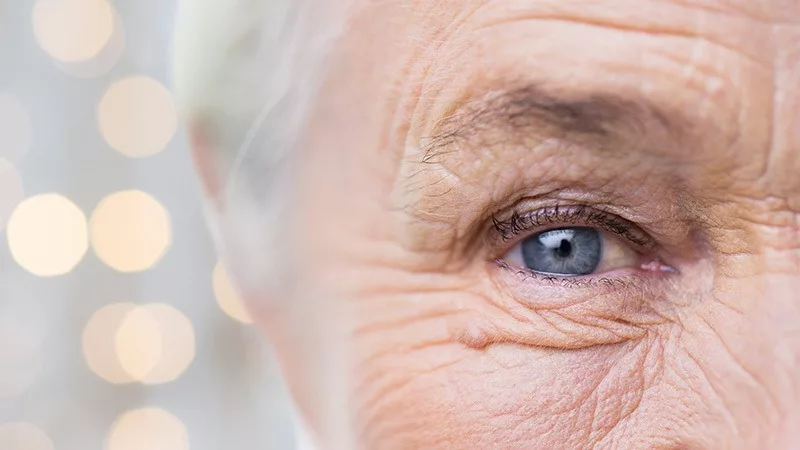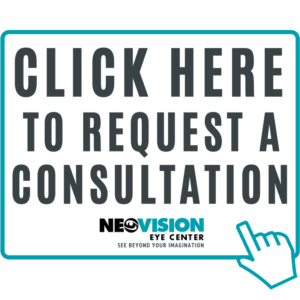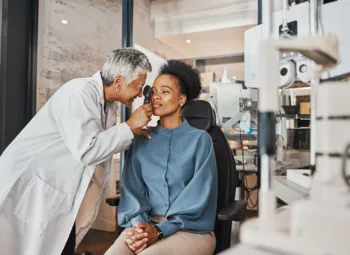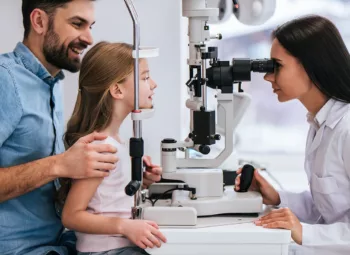
The Most Common Questions about Presbyopia Symptoms, Causes, Diagnosis, and Treatment
Losing the ability to focus on small print, or see things clearly up close is a major life changing event that is impossible to ignore. Perfect vision doesn’t last forever, and the age-related eye condition known as presbyopia happens to everyone. Today, about 25% of the world’s population, or 1.8 billion people, are affected by presbyopia to varying degrees. Even those with perfect vision through adulthood will experience age-related farsightedness in their later years. In this guide we will answer your four most common questions about presbyopia, to help you learn more about this age-related eye condition and its effects on your vision.
1. What Causes Presbyopia?
One of the most common questions asks about presbyopia is what causes it. The lens of your eye is responsible for bending and focusing rays of light on your retina, allowing you to see clearly. When we are young, our lenses are soft and flexible, changing shape to allow our eyes to focus on objects at various distances. As we age, our lenses can gradually harden and become less flexible, resulting in presbyopia – a decreased ability to focus clearly on things up close.
2. What Age Do You Usually Get Presbyopia?
Most patients begin to experience age-related farsightedness between the ages of 40 to 45. In this case, you can expect your presbyopia to gradually worsen every one to two years.
However, it is possible for you to develop this age-related vision issue as young as your mid 30’s. If you have struggled with farsightedness (hyperopia) in your early years, your eyes are already working hard to focus on objects up close, and you may experience presbyopia earlier in life.
If you are experiencing any changes in your vision at any age, it is important to consult an ophthalmologist and receive a comprehensive eye exam to screen for any potentially detrimental eye conditions.
3. What are the Symptoms for Presbyopia?
Presbyopia can present with many symptoms including:
- Blurry vision when looking at things up close, like your smartphone or a book
- Holding reading material further away from your face to focus better
- Requiring brighter lighting to see clearly
- Your eyes feel uncomfortable or tired when focusing on things up close
- Headaches, eyestrain, or fatigue
Typically vision changes caused by age-related farsightedness will gradually worsen over time, so if you experience a sudden loss of vision clarity or any abrupt change in your eyesight, consult with an ophthalmologist immediately.
4. Can You Correct Presbyopia?
Another of the most common questions about presbyopia is available treatment options. The ophthalmologists at NeoVision Eye Center specialize in diagnosing and treating all vision conditions and degenerative eye diseases. We proudly offer all of our patients the latest and most advanced vision correcting solutions personalized to suit your needs. Treating presbyopia can include common vision correction solutions like glasses or contact lenses, or more permanent therapies such as laser eye surgery.
Correcting Presbyopia with Reading Glasses
Reading glasses are one of the simplest ways to correct the effects of presbyopia and regain vision clarity up close. Because presbyopic vision will continue to gradually get worse as you age, your vision prescription will change overtime, so you will require routine eye exams.
Your vision quality will also likely differ from eye to eye, making over the counter glasses like “readers” or “cheaters” not an ideal solution for most people. Cheap, off-rack glasses that are not optimized for your specific vision proscription can actually strain your eyes even further, and result in weakening your eye’s focusing power even faster.
At NeoVision, we offer comprehensive optical services including a wide selection of reading glasses that optimize your vision at any magnification or distance. We take pride in providing top-of-the-line frame styles, and lenses that combine different ranges of focusing strength for personalized vision correction.
Contact Lenses for Presbyopia
Similar to reading eyeglasses, contact lenses can also correct age-related farsightedness, and can be enhanced with different focal strengths to assist you in viewing things at a distance as well as up close.
At NeoVision, we can custom fit corrective contact lenses based on your eye shape and vision correction requirements per eye. We also offer lenses in both hard and soft contact types, with some options even being single use if necessary.
Refractive Laser Surgery for Presbyopia
If you would prefer not to rely on corrective eyewear to correct your presbyopia, refractive laser eye surgery may be an ideal solution for you, but not everyone will be an ideal candidate. Contact the board-certified ophthalmologists at NeoVision Eye Center to discuss the best treatment options for your needs.
Ask All These Common Questions about Presbyopia and More at NeoVision Eye Center in Union City
Even though presbyopia is a natural part of aging, our ophthalmologists at NeoVision Eye Center are here to guide you through this change and provide personalized solutions for your unique needs.
Living with this age-related eye condition can be frustrating for even the simplest day-to-day tasks. Luckily, it’s clear that you don’t have to suffer from presbyopia! At NeoVision Eye Center, we pride ourselves on providing the highest quality care to all our Bay Area patients. We are happy to answer any questions about presbyopia and help you find the right solution so you can live a better, blur-free life!
If you believe you are suffering from presbyopia and would like to discuss your eye care options contact our experts at NeoVision Eye Center today.






